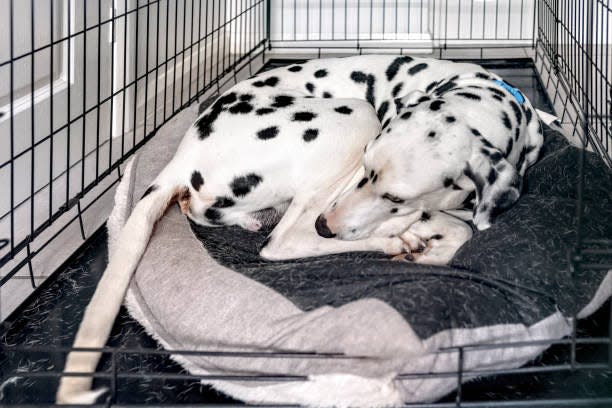ALL ABOUT DOGS: Crates suit Max's den mentality and need for security

Question: We just adopted a 2-year-old Lab mix who apparently was never really potty trained. I know you're a big proponent of using the crate, but not me. Is a crate mandatory here or is there another way?
Answer: If you're not going to use a crate to potty train him, it really takes a lot of vigilance. Because even though he is older, you're circling back to give him the same training he should've had as a puppy.

The main advantage to a crate comes from the fact that your dog is a den animal and should have a natural attraction to it. Dogs that don't have crates usually demonstrate some sort of "denning behavior." They'll get under desks and tables, or in corners. The other advantage to a crate is that dogs have a natural aversion to soiling their den. Crates should be just big enough for your dog to lay down in, and turn around.
But it's not unusual for a dog in an adoption situation to have never been exposed to a formal crate, and there's no telling what kind of situation your dog came from. But he possibly didn't have have guidance on much of anything. So this is remedial potty training.
I can't tell you how often dog owners give up on a crate because their dog fusses some about it. That's not unusual at first for an adoptee, even with his natural attraction to a den. So I would suggest hanging in there with the crate perhaps a little longer. I have witnessed dogs with severe separation anxiety absolutely flip out and pretty much tear a crate apart, or really injure themselves trying to get out. If your dog doesn't have a severe reaction like this, you probably have a decent chance of crate training if you take it slow.
I suggest leaving the door open on an appropriately sized crate, letting Max come and go as he pleases. Feed him in there and put his water in the crate, too. Start putting his favorite toys in there for him to go in and get, and a clothing item of yours from the dirty clothes. Do this for a couple of days. This familiarizes him with the crate without causing any stress.
During this period, you really have to keep an eye on him to keep him honest, since you don't have the full potty training advantage of the crate. Besides vigilantly watching him, he needs to go out on a regular basis, and get rewarded in an over-the-top fashion every time he goes to the bathroom outside. This rewarding should happen within two seconds of him finishing, and I would include a high value treat to really push the hot button of positive reinforcement.
During this phase, you will have to keep your eye on him at all times to make it impossible for him to have an accident in the house. If you need to keep him on a 6-foot leash and have him follow you around the house to accomplish this, so be it.
After about two days of this, have a treat in your hand, and lure Max into the crate. Once he's in, give him the treat, praise him up and close the gate. Stay nearby, and leave him in there for 1 minute. Then let him out and tell him what a good boy he was. I would run this exercise with him randomly several times on this day. Do not let him out if he's fussing. That's why we stay in the room and only have him in there for 1 minute.
Run this same exercise the next day at least five or six times, advancing his time to 2 minutes. Continue feeding him the crate, and advancing his time each day by 1 minute. By the time he gets to 5 minutes, there's a chance you can leave him in there for 10 minutes with you out of the room.
From there he should be used to the idea, and you should be able to keep him in there as long as needed. Never let him out if he's fussing. You may be surprised how he quiets down once he realizes getting out is non-negotiable.
Originally from Louisiana, Gregg Flowers is a local dog trainer who “teaches dogs and trains people.” Contact him at dogteacher7@aol.com or dogsbestfriendflorida.com.
This article originally appeared on Sarasota Herald-Tribune: GREGG FLOWERS: Crates are still best option for Max's potty training

